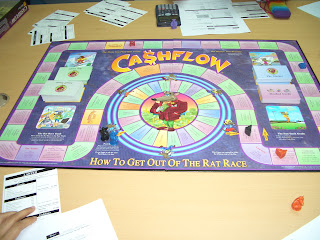Money Management Made EasyT. Harv
Eker, in his best-selling book, “
Secrets of the Millionaire Mind” said: “Rich people manage their money well. Poor people mismanage their money.
He took the point further by saying that wealthy people are not any smarter than poor people because they just have different and more supportive money habits. The difference between a financially successful person and a financial failure is how well that person manages money. So in order for you to master money you must manage your money.
How can we manage our money?T. Harv
Eker suggests that in order for us to manage our money effectively we should have separate accounts in which we will funnel our monthly pay check. See break down of accounts below:
10% Financial Freedom Account
10% Play Account
10% Education Account
10% Long-Term Savings for Spending
10% Give Account
50% Necessities Account
Allow me to give you a play-by-play of Mr.
Eker's Account Scheme:
Financial Freedom Account. This is the center piece of his money management Scheme. All you have to do is to put 10 percent of every peso or dollar you earn (after taxes) into this fund. This money is only to be spent for investments or passive income generating assets. Take note that this money is
NEVER to be spent! It will only be invested so that the principal will
NEVER be consumed and you can live of the interest/dividends/profits from the Financial Freedom Account.
Play Account. This is what sets
Eker apart from other financial gurus. He says that we must spend at most 10% on luxuries every month. I know that this might raise a few eyebrows out there but
Eker explains that One of the biggest secrets to managing money is balance. The “Play account” serves as a balance to the “Financial Freedom Account”. He stated that Since your want to save as much money as possible so you can invest it and make more money; you must also balance this self discipline by REWARDING YOURSELF. This was really good news for me when I read it. I’
ve been doing this for the past year and every month I would step out of the office and splurge on a
Grande Latte!!! My friends would see me at Starbucks and I would say, “Don’t mind me I m just managing my money”. Definitely a stroke of brilliance on T. Harv
Eker’s part. By setting an account where you blow money away every month it
satisfies the “deprived” part of you that manages money. The effect is astounding because since you are rewarded for managing your money, the tendency is that you want to do it again next month. What a concept!!
Education Account. The education account provides for your financial education. This money is to be used for seminars and courses that would help you learn more about business, money and investing. Personally, I use this account when I buy books on personal finance, accounting and business. It’s very effective because knowledge is leverage. This January I spent my Education Account to take short courses in the Philippine Stock Exchange. The courses offered taught value investing which is very useful when determining which Stocks are priced at a bargain. With this new knowledge I was able to take advantage of the Global Sell of last February 28, 2007. This month I plan to spend My education account to attend the Real Estate Investing seminar of Larry
Gamboa (Author of Think Rich
Pinoy).
Long-term savings for spending. This Account serves as my buffer account. I use the Long-term savings for “rainy days”. This is where I get the money for unforeseen expenses such as medicine or accidents. It is very important because it is the first , last and only line of defense that protects your Financial Freedom Account.
Give Account. The give account is the “Charity” account. It is needed to balance out our “inner self” or spiritual side. Usually a person who manages and accumulate money feels guilty because he or she has money and other people do not. A person who is overwhelmed by these feelings of guilt usually go on a spending splurge that ruins all their hard work in managing their money. So in order to counter act this, a simple act of charity every month affirms that persons commitment to managing his or her money. Just as having a fun account satisfies the “fun-loving” side of a person. A Give account satisfies the person’s soul.
Necessities Account. Finally, half of your paycheck is allotted for your normal expenses. This includes expenditures for your electricity, water, food , rent and clothes. I suggest that you just spend it normally. If you have any money left over you can put the excess cash to your Financial Freedom account thus making it grow faster.
There you GO! That’s T. Harv
Eker’s Basic Money Management Scheme. Bear in mind that the percentages are not etched in stone. Feel free to adjust the allocation to tailor fit you needs. It
doesn’t matter whether your paycheck is 100 Pesos or 1Million Pesos , what matters is you develop the habit of managing your money. The habit or the act of segregating you paycheck is more important than the size of the paycheck because if you cant manage 100 pesos I assure you that you cannot manage 1Million pesos.
The system is so simple and elegant and has worked for me. I suggested it to my Friend Feline13 and she was able to start building her own
FFA account so I know It’s not a fluke.
So take the next step!! Start by opening an extra ATM account that will serve as your Financial Freedom Account and manage your money.
Yours in Abundance,
Larry
Buan

